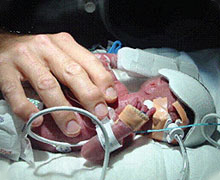Neonatal Respiratory Support Technologies Team
Revolutionizing Respiratory Care for Infants: Addressing a Global Crisis

The devices that provide life support to infants in the U.S. are rarely appropriate for resource-limited countries' healthcare settings.
Approximately 1.1 million infants die each year worldwide, and over a large portion of those deaths are due to respiratory insufficiency, a sometimes deadly condition that commonly occurs when an infant is born prematurely with underdeveloped lungs. Providing these premature infants with a small amount of breathing support, typically delivered by mechanical ventilators in the United States, often makes the difference between life and death. Modern mechanical ventilators are unfortunately of little use in many resource-limited countries' healthcare settings because they are too expensive to buy and maintain, and require highly-trained personnel to operate and repair them.
In response to this challenge, the Neonatal Respiratory Support Technologies (NeoRest) team, based in Seattle Children's Research Institute's Center for Integrative Brain Research, is working to reduce infant mortality and morbidity by developing affordable, easy-to-use and easy-to-maintain respiratory support solutions. The team's innovative approach to respiratory care, including the development of respiratory support devices may revolutionize the way premature infants are treated in resource-limited countries.
Preterm birth is a major global health crisis that needs more focus, attention and research. The NeoRest team is striving to develop solutions that decrease the impact of preterm birth and ensure that children everywhere can go on to lead healthy lives.
Team Members
-

-
Jack Hildebrandt, PhD
-
Chris Howard, MBA
-
John Walton